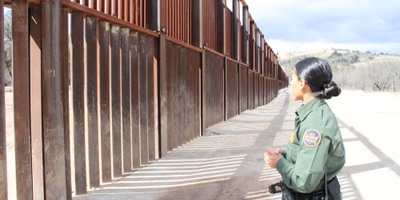Border Patrol Agent
One of the most crucial parts of minimizing illegal immigration and travel into the United States is protecting the border. Border Patrol Agents work for U.S. Customs and Border Protection, guarding approximately 6,000 miles of our borders with Mexico and Canada. If you’re willing to live in these parts of the country and want to keep our borders safe, this may be a great job option for you.
To find out how you can work as a border patrol agent, or other relevant career in criminal justice, contact the schools listed in our directory. By comparing several programs, you can be sure to choose the right one before you enroll!
Border Patrol Agent Job Description
Border Patrol Agents are responsible for many different tasks in the course of their jobs. You may have to check vehicles and people as they enter the country to ensure that they can legally be there. In addition, you must watch for people trying to bring weapons and illegal drugs into the country. Of course, one of the most significant parts of your job is preventing illegal immigrants from entering the country; this includes making sure that they are not being smuggled in or hidden.
As a Border Patrol Agent, you can have a huge influence on the safety and security of our country’s borders. And it’s not just on our southern border that illegal immigration is an issue; recent news articles point out the illegal immigration issue exists along our northern border as well.
On a day-to-day basis, your job duties may change depending on the needs of US Customs and Border Protection. You may spend long periods of time on foot, on bike, or in a vehicle. Since the terrain varies all along the border, you may get around in a variety of ways to work as efficiently as possible. The agency has a thorough border protection protocol that you must follow.
In addition, traffic checkpoints and transportation checks may be major parts of your new career. You may stop incoming cars, check them for illegal contraband, and check the interior of trains, buses, and other types of transportation. If you find someone or something that should not be entering the country, you may have to conduct arrests and transport suspects to the local law enforcement office. If you come across drugs or weapons, you may have to seize them and fill out reports on your discovery.
How to Become a Border Patrol Agent
Border Patrol Agents are hired at a variety of levels. These levels determine your possible promotions as well as your minimum and maximum salaries. The lowest level you can qualify at is the GL-5 level. You can qualify by having work experience in leadership, stressful situations, and working with the public. Law enforcement experience can be helpful, but it is not necessary. At this level, a bachelor’s degree in any field can also make you qualified for a border patrol agent job.
At the GL-7 level, you need one year of law enforcement experience. This work experience must include making arrests, using firearms safely, working courteously with the public, making prompt decisions in law enforcement situations, and maintaining a network of informants. If you do not have the required work experience, you can qualify with a bachelor’s degree and one year of graduate-level education in criminal justice or a related field. The GL-9 level is the only level that requires experience and does not allow you to qualify via education.
Upon making it through the hiring process, you may be expected to attend a rigorous training program. Training takes place at the US Border Patrol Academy in New Mexico. You’ll complete 58 days of training while learning about immigration laws, marksmanship, and physical fitness. If you do not speak Spanish, you may need to complete 40 additional days of training to learn Spanish. You may be tested rigorously on your skills before you get assigned to a spot on the border.
Border Patrol Agent Salary and Career Outlook
In recent years, illegal immigration has become an even bigger problem in the United States. The government is under lots of pressure to stop the problem in its tracks and keep our borders secure. As a result, the job outlook for Border Patrol Agents may be very good. The job outlook may be better for those who are already fluent in Spanish or who have experience in immigration law.
Your potential salary range depends on what level you get hired at. Border patrol agents are hired on a latter, starting and progressing from GL-5, to GL-7, to GL-9, to GS-11 and GS-12. According to the Office of Personnel Management, the average starting salary for border patrol agents at the GL-5 level in 2023 was $62,095, including locality and overtime pay. Those at the GL-7 level receive starting salaries of $71,152, and those at the GL-9 level may earn $80,046. As you gain experience as a Border Patrol Agent and get more seniority, you may be able to increase your salary and move up levels.
2022 US Customs and Border Protection salary and employment figures contained here reflect national data, not school-specific information. Conditions in your area may vary. Data accessed November 2023.
Start working towards a career in criminal justice today. Take the next step, and reach out to schools in your area to request more information!


